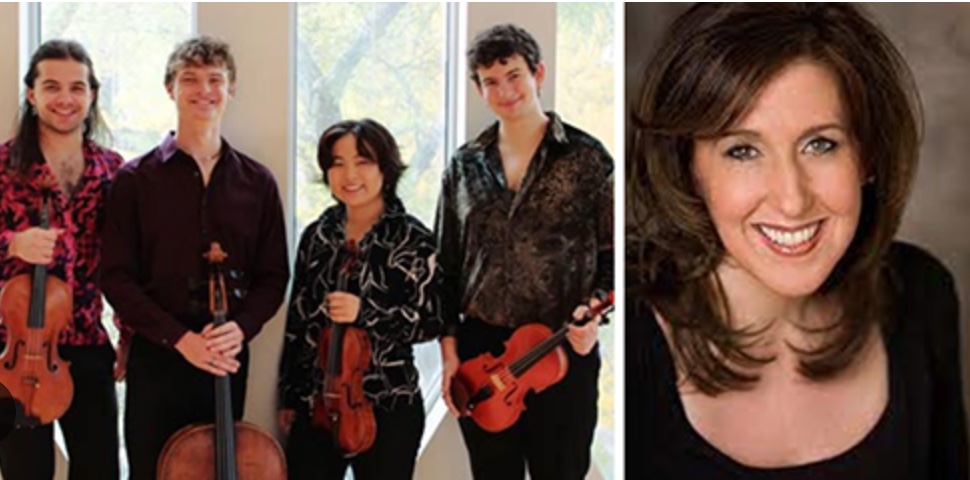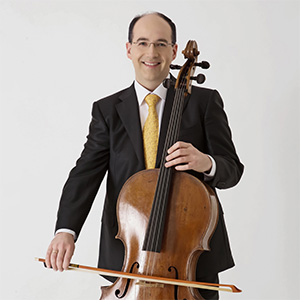by Daniel Hathaway
Apollo’s Fire’s “¡Hispania! A Voyage from Spain to the Americas” wraps up its run (Saturday at 8, St. Paul’s, Cleveland Hts.), as does The Cleveland Orchestra’s Nordic program (Saturday at 8 at Severance), and Baldwin Wallace Opera’s The Merry Widow (Saturday at 3 & 8 and Sunday at 3 in Gamble Auditorium.)
Heights Arts Close Encounters will feature Cleveland Orchestra members (Sunday at 3 at Dunham Tavern), Arts Renaissance Tremont will present Cleveland Orchestra principal cello Mark Kosower (pictured) with Tatiana Lokhina, piano & the Cavani String Quartet (Sunday at 4 at St. Wendelin), Factory Seconds Brass — Cleveland Orchestra second chair players Jack Sutte, trumpet, Jesse McCormick, horn & Richard Stout, trombone — will play on Hudson’s Music from the Western Reserve Series (Sunday at 5 in Christ Church), and the Los Angeles-based contemporary music ensemble Wild Up will showcase music by Julius Eastman in Mixon Hall at CIM (Sunday at 7:30).
For details of these and other events, visit our Concert Listings.
NEWS BRIEFS:

The Quartet will perform with Baldwin Wallace faculty mezzo-soprano Nancy Maultsby on Monday evening, March 25 at 7:30 in Gamble Auditorium in Berea. Read a ClevelandClassical preview article here.
In Thursday’s edition of Britain’s The Guardian, Lanre Bakare writes: “A decision to axe a mixed choir at St John’s College, Cambridge, in an attempt to make room for a “broader” range of music has been condemned as “fundamentally regressive” by the former archbishop of Canterbury Rowan Williams, Sir Simon Rattle, Dame Sarah Connolly and Aled Jones.
“The decision to cancel funding for St John’s Voices – which has male and female singers and has been running since 2013 – will ‘diminish’ choral music at the college and has left its members ‘devastated,’ according to an open letter.” Read the article here.
WEEKEND ALMANAC:
March 23:
There are three very different organist-composers to honor today: German Kappelmeister Johann Gottfried Walther who died in Weimar on this date in 1748, German Romantic composer Julius Reubke, born on March 23, 1834 in Hausneindorf, and Eugène Gigout, born ten years later in Nancy.
J.S. Bach’s cousin and almost his exact contemporary, Walther authored an important Lexicon, the first German-language encyclopedia of music, as well as some 132 organ works that include both elaborations of chorales and transcriptions of Italian orchestral concertos that were popular in Germany during his era.
His variations on Jesu, meine Freude are among his best. Listen here to a performance by Tom Anschütz on the 17th-century Hoffmann organ in Langenhain (near Frankfurt), rebuilt by Knauf in the 18th century, and by Kutter (ongoing) in 2020.
Walther’s Concerto el Signr. Meck is mislabeled — it’s actually a work by Vivaldi, but remains one of Walther’s most popular reworkings. Hear it played by Dutch artist Jacques van Oortmerssen on the organ at the Smarano Organ Academy in Italy, and then in an arrangement of an arrangement — for two marimbas, played by Marimbazzi, the young Polish percussion duo of Paweł Dyyak and Jakub Kołodziejczyk.
Reubke died at 24, which didn’t give this disciple of Liszt much time to compose, but he left two relatively monumental works to posterity. Listen to his Piano Sonata played by Austrian pianist Til Fellner here, and to his Sonata on the 94th Psalm played by American organist Nathan Laube here (at a Pittsburgh regional convention of the American Guild of Organists).
And two pieces stand out among French organist Eugène Gigout’s works for the instrument. His Toccata in b minor is quintessentially French (Jonathan Moyer plays it here on the organ at Cleveland’s Church of the Covenant), while his Grand Choeur Dialogué lends itself to various call-and-response echo treatments. Jonathan Scott plays it here in its original organ solo format on the Pascal Quorin organ at Évreux Cathedral, in Normandy, France.
And now the fun begins. If you have two players and two organs at your disposal, you can play it like Peter Eilander and Jaap Eilander do at the Laurenskerk in Rotterdam. If it’s just you and you have organs in multiple locations, you can arrange the work like Michael Hey did at St. Patrick’s Cathedral in New York. Or go all out and add brass and percussion as Michael Murray and the Empire Brass did in their over-the-top Telarc recording at Boston’s Church of the Advent.
March 24 — by Jarrett Hoffman
On this date in 1721, J.S. Bach dedicated his Six Concerts à plusieurs instruments to Christian Ludwig, Margrave of Brandenburg-Schwedt. That set of concerti grossi have since become known as the Brandenburg Concertos, hailed as some of the greatest works of the Baroque era.
With a performance in 1719, Bach had impressed the music-loving Christian Ludwig, who then commissioned several works. But when the margrave received the Brandenburgs in 1721, he was looking at music that had not all been composed in the prior two years — some of these concertos may have dated as far back as a decade or more, selected and revised for the occasion.
Did the margrave know this? We can’t be sure. But we do know that the compensation was not lucrative: Bach went unpaid.
Royal dedications from centuries gone by can be hilarious, obsequious to the max. In this case, it’s fun to imagine that Bach may have been compensating for delivering leftovers, even really good ones. Either way, here’s the first sentence alone from the composer’s March 24 dedication, translated from the French:
As I had the good fortune a few years ago to be heard by Your Royal Highness, at Your Highness’s commands, and as I noticed then that Your Highness took some pleasure in the little talents which Heaven has given me for Music, and as in taking Leave of Your Royal Highness, Your Highness deigned to honour me with the command to send Your Highness some pieces of my Composition: I have in accordance with Your Highness’s most gracious orders taken the liberty of rendering my most humble duty to Your Royal Highness with the present Concertos, which I have adapted to several instruments; begging Your Highness most humbly not to judge their imperfection with the rigour of that discriminating and sensitive taste, which everyone knows Him to have for musical works, but rather to take into benign Consideration the profound respect and the most humble obedience which I thus attempt to show Him.
You can watch Apollo’s Fire in a live performance of the first movement of the Fifth Concerto at Tanglewood in 2015 here, with Jeannette Sorrell at the harpsichord, Olivier Brault on the violin, and Kathie Stewart on the flute.
Cleveland’s Baroque Orchestra also collected all six Brandenburgs — plus selected harpsichord and violin concertos — in an album from 2010 that you can purchase here.




